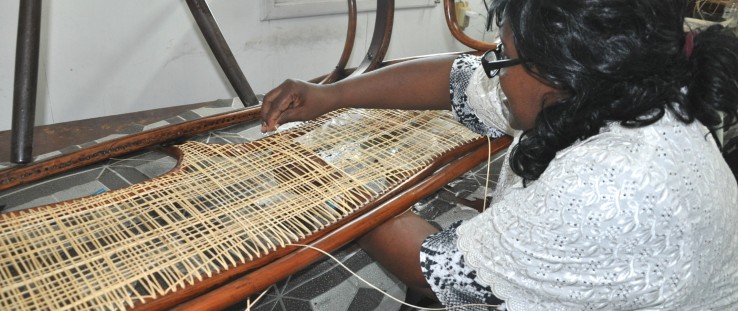 Claudette Thompson demonstrates her skills by caning one of many chairs for her organization Superior Crafts and More Ltd.
Kimberley Anne Weller, USAID
Claudette Thompson demonstrates her skills by caning one of many chairs for her organization Superior Crafts and More Ltd.
Kimberley Anne Weller, USAID
 Claudette Thompson demonstrates her skills by caning one of many chairs for her organization Superior Crafts and More Ltd.
Kimberley Anne Weller, USAID
Claudette Thompson demonstrates her skills by caning one of many chairs for her organization Superior Crafts and More Ltd.
Kimberley Anne Weller, USAID
When you meet Claudette Thompson, you are immediately taken with her high energy, infectious laughter, love of people and bubbly personality. It’s a far cry from the shy, introverted person you might have encountered only a few years ago.
Back then, the 49-year-old had few friends and found interaction with others difficult. Like so many in the blind and visually impaired community in Jamaica, she faced hardships her whole life, especially during her school years and when trying to enter the workforce.
In 2007, her path started to change when she received training in caning chair seats and other furniture. The next year, she began work as a caner with Superior Crafts and More Ltd., a small furniture social enterprise that particularly employs people from the blind community. It was a good opportunity and one that began to coax her out of her shell, but progress was marred by uncertainty.
Although the organization’s handiwork was popular with the locals, by 2009, the business was struggling to survive. “For years we never knew anything about a business plan or keeping financial records, we simply worked from hand to mouth. Therefore, we were not even sure if we were making a profit or a loss, or keeping in contact with our customers,” Thompson admitted.
The organization could not grow. The company did not add more employees and could not pay those it had in a timely manner. Even the building became dilapidated, posing a health hazard to workers.
Superior Crafts and More was in a situation that affects many social enterprises. According to research, organizations in the social and solidarity sector in Jamaica have historically struggled to achieve viability and carry out their missions. Because many social enterprises identify as not-for-profits with little motivation to grow, the sector lacked structure, leadership and a data repository.
USAID is helping to change the dynamics. In 2012, USAID introduced a partnership, the Social Enterprise Boost Initiative’s (SEBI) project, which helps create an enabling business environment for social enterprises in Jamaica and helps them transition their grant-funded operations into viable, profit-making businesses that can support their social missions.
Recognizing the benefits, professionals in Jamaica’s social sector are taking steps to improve business models. “Through SEBI, we have started the process of integrating the social enterprise business model into the psyche and practices of local entrepreneurs and members of the social sector,” explains Saffrey Brown, general manager of the Jamaica National Foundation. “However, we acknowledge that more support is needed at this stage if social enterprises are to engender the change and social impact that they promise.”
That support is underway. Since its inception, SEBI has helped participants achieve efficiency and growth, while strengthening the voice and visibility of social enterprises.
USAID has partnered with eight social enterprises during the past three years. In that short time, the businesses have improved their management and marketing skills, thereby enhancing their operations. To date, they have generated revenues in excess of $330,000, created 15 new market-ready products and services, and employed approximately 130 community members.
USAID has now extended its partnership with SEBI for two years and recruited 15 additional social enterprises and social entrepreneurs, including members from the deaf community. These activities will continue to support Jamaica’s Vision 2030, which seeks to make Jamaica the place to live, work, raise families and do business.
Working with SEBI has certainly impacted Superior Crafts and More. Under the partnership, the enterprise participated in extensive business and marketing training sessions, which allowed them to develop a business and operational plan. Ongoing one-on-one business consultations helped the business to start making a profit. And computers with voice activation were installed to help with operations.
The organization now boasts a strong business operations plan, a robust recordkeeping system, and a diverse and growing customer base. The group also saw a 151 percent increase in revenue in 2014, thanks to the knowledge gained.
Now healthy, the company can provide opportunities that enable the visually impaired and blind to live meaningful and productive lives. Currently, 17 people work for Superior Crafts and More, most of whom are blind or visually impaired.
“Initiatives like SEBI are essential to the successful integration of boosting the wider economy. In light of dwindling donor funds, self-sufficiency should be the main focus of the nonprofit sector, and, therefore, social enterprise provides the best opportunity for funds to be realized,” says USAID/Jamaica program specialist Claudette Anglin. “USAID is focused across the globe on fostering locally owned sustainable solutions, which add economic and social benefits to communities and, by extension, nations. We achieve this through direct partnerships with private sector groups, local entrepreneurs, civil society organizations and host country governments. The result: robust nations, sustainable economies and democratic societies.”
The success is personal for Thompson. She has come out of her shell, earned her place as a manager at Superior Crafts and More, and sees a brighter future.
Before, she says, “I was not near anything like this, the person that I am today. Before the intervention, I would try to be invisible, hiding at the back.” But now? “I am confident as a visually impaired person. I know my rights and the rights of my fellow blind colleagues. Being disabled does not mean you are not a person. You have the [same] right as everybody and you can live like everybody else.”








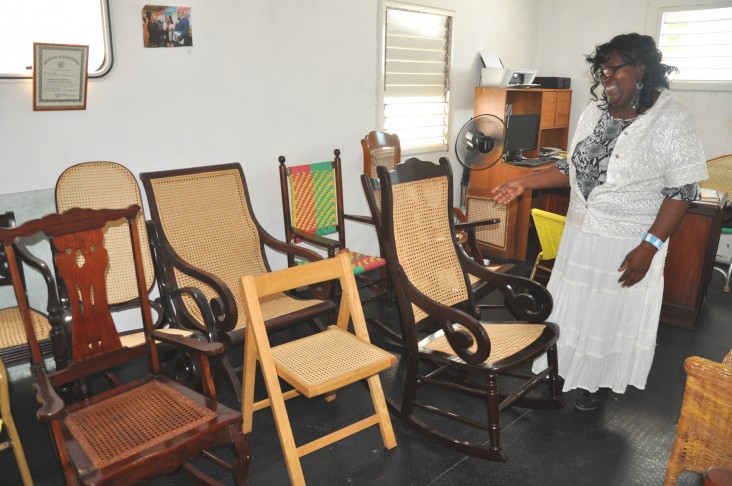
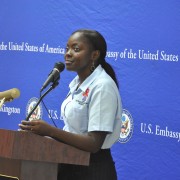
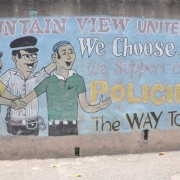
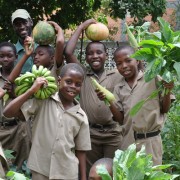
Comment
Make a general inquiry or suggest an improvement.